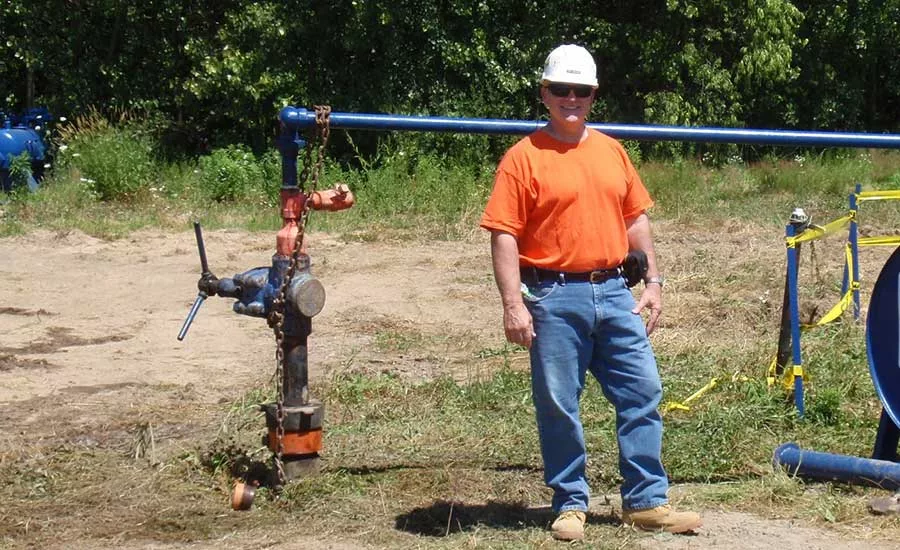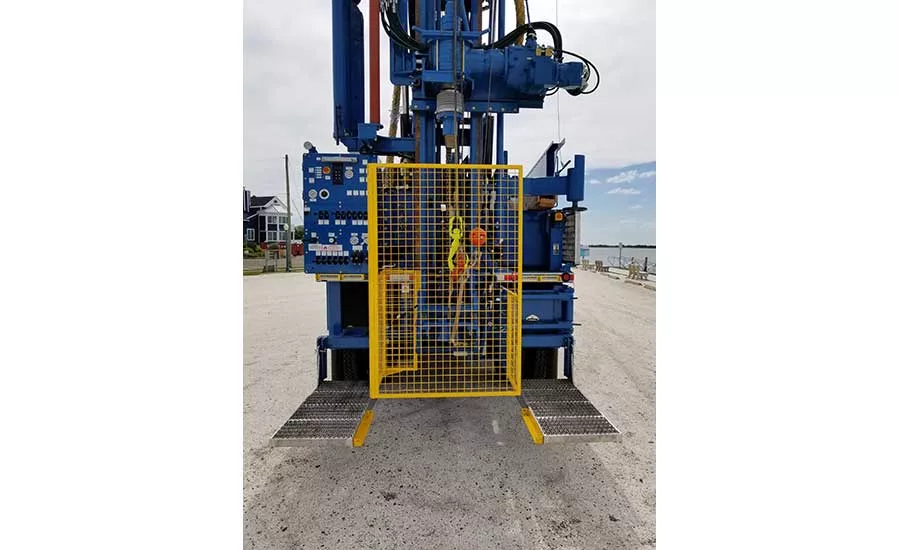You Know the Drill: Longtime Driller Finds Value in Geology Background

While the tools and technology used for drilling have changed tremendously over the course of his career, Art Becker, CPG, MGWC, says the core fundamentals of business success — hard work, dedication, client service and honesty — have not. Source: Drilling and Safety Consultants LLC

While he still ventures into the field sometimes, most of Becker’s work is done in the office. He says the task at hand is much easier with just himself to manage and no drilling equipment or crews to account for. Source: Drilling and Safety Consultants LLC

Becker says he thinks safety is finally getting the recognition it deserves in the drilling industry, which is good because without people there is no business. Equipment features like safety cages help reduce risk. Source: Drilling and Safety Consultants LLC
Art Becker, CPG, MGWC, graduated from Rutgers University in 1972 with a degree in geology. His first job was with a family-owned drilling business in New Jersey. They needed someone to explain municipal and industrial well project plans to planning boards. He went on to start his own environmental drilling business in New Jersey in 1985, Environmental Drilling Inc. (EDI). He sold it to SGS North America Inc. in 1991 and continued operating the environmental drilling division of the company until 2014.
Becker considers himself semi-retired now, but says he has no plans to officially leave the industry any time soon. To stay active, he founded Drilling and Safety Consultants LLC, a one-person company that holds an exclusive consulting agreement with the environmental drilling division of SGS. He offers administrative, operational and business services, bidding on large drilling projects in the hundreds of thousands of dollars.
Becker’s passion for drilling is clear not only through his refusal to retire, but through his activeness outside of the workplace. He served as the president of the National Ground Water Association (NGWA) in 2011. He is chairman of the New Jersey State Well Drillers and Pump Installers Examining and Advisory Board, holds drilling licenses in 11 states, and is a member of the American Institute of Professional Geologists (AIPG).
An educational background in geology played an important role in his success, particularly in the early stages of his career. It helped Becker determine which drilling tools to use and what type of geology was beneath the surface. “As far as client services, they’d say we need to drill in a certain area of New Jersey and I’d be able to say, ‘Well, if you’re going to drill there you have to use air rotary.’ That’s not to say that a drilling contractor with years of experience wouldn’t know that. But the bottom line is, I think it allowed me to evolve quicker in the industry by having that knowledge,” he explains.
Q. What do you do and what keeps you coming back every day?
A. What keeps me interested in the industry are the people I work with and the challenge of executing a successful project. There are a lot of logistics in drilling operations, and planning and execution are the keys to a successful project and a satisfied client. I think the satisfaction of being part of a team that executes correctly is very gratifying to me.
Q. What does a typical workday involve?
A. I still go in early in the morning. It seems like I have an internal clock that says to get up and get going usually around or before 6 a.m. I spend most of my time on the computer doing large project estimates or writing up operational and administrative safety procedures. I spend time daily communicating with the client by telecom, email and text. Some days require that I go out to sites for project visits and have a meeting with a client. Occasionally, I will have training events for some clients, and I really enjoy sharing my experience and knowledge with younger people. So I really like that activity. … I don’t have any plans to retire in the immediate future. I really enjoy staying active. It’s a good balance now. I can stay active and I can do things in the industry, but I also can take time off. So most of the projects I do, I decide when I’m going to do the work. … When I worked 60 hours a week, it was Monday through Friday and sometimes Saturday, and you didn’t want to do much on the weekends because that was your time to catch your breath. Now I’ve been able to strike a good balance where I keep my mind active and enjoy what I do, while at the same time being able to have the free time to do what I want. … I would say 35-40 percent of [my role involves safety]. … Writing up specific job safety analysis, for instance, about how to execute a job safely. … To me it’s critical for a number of reasons: number one, to keep your people safe, but also to provide a safe environment for your clients and demonstrate to them that you care about your people and you care about their people in the field as well.
Q. What does it take to succeed in what you do?
A. I really feel it’s honesty, integrity, hard work, and accepting challenges and adversity with a “yes I can” attitude. I believe a positive approach and embracing these values will allow anyone to be successful at any business. So those attributes are not just required to be successful in the drilling business. I think you’d have to be that way to be successful in any business. Also, I spend a lot of time with clients and listen to their needs and expectations, and then execute to meet the desired result.
Q. What do you wish you knew when you started?
A. To effectively delegate so I could be a good leader, yet give responsibility to others and hold them accountable. I was a typical do-it-yourselfer and tended to take on too much so that it limited the growth of our firm. It took me a year or so of business ownership to get it right. I would say giving your people responsibility and accountability is the key for success; not only the success of business but the success of employees to recognize their potential by making them reach. Sometimes people limit their potential and say “I can’t do that,” but if you say, “I think you can” and you assist them, you can help them reach that goal.
Q. What tool can you not imagine working without?
A. A computer. When I founded EDI in 1985, the PC was just being introduced into business. Now you can’t be without one, nor could I imagine working without one.
Q. What’s the best piece of advice you’ve been given?
A. The best piece of advice that was given to me was from my boss when I announced to him that I was leaving the firm and starting my own environmental drilling business. He said to me, “You have to learn to say no.” He said I had a tendency to try to please people no matter what it takes, and he said to be successful in business, I had to be able to recognize when it was time to say no to a client.
Q. How would you describe the present state of the industry?
A. I would say it’s changing and challenging. The drilling industry has so many sub-industries like mineral, geotech, environmental, water well, construction, geothermal. They all ebb and flow depending upon the economy, regulation, politics and technology. When I look back to when I started 45 years ago, it seems conditions were the same and we survived it. So it seems like it’s changed, but it hasn’t changed. It was challenging when I entered it 45 years ago. We were challenged with all those issues, and here we are 45 years later, granted a lot has changed, especially technology. But the bottom line is, it’s changing yet we manage to exist within that change and have met the challenges that the change has caused.
Looking for a reprint of this article?
From high-res PDFs to custom plaques, order your copy today!





